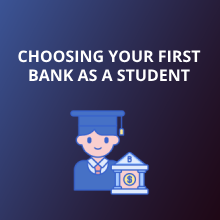When you graduate from school and enter university, the process of separation from your parents is inevitable.
You start your own life with many new responsibilities and decisions.
One of the most important decisions is the choice of the first bank.
However, finding the right bank that perfectly matches your financial objectives can be quite a challenge.
There are many things you need to consider, such as fees, accessibility, and customer service.
And don’t forget that the ideal bank should help you manage your finances effectively so you can save for the future.
Lack of experience in choosing a bank can make the process overwhelming.
That’s why we’ve decided to share some tips for first-time bank account holders.
Read on to learn more and make a smart decision for the future.

Top 5 Tips for Choosing a Student Bank Account
1. Figure out what you need
As a student, the first thing you should do is to define all the financial needs that your bank has to meet.
Is it important to you to have low or no monthly fees?
Are you interested in convenient ATM access?
Do you use online banking services or rely on physical bank branches?
Answer these questions before you start looking for the right bank.
Much like how every specialized writing service includes a writer to assist with essays, every banking institution features a consultant, paralleling services like research proposal writing help.
These professionals are essential in guiding customers through the myriad of account options and their advantages, echoing the tailored support offered in academic writing guidance.
Their main job is to guide you through all types of accounts and their benefits.
Maybe your parents or friends have already recommended some options and you have several banks in mind.
Don’t hesitate to contact them and ask for assistance.
This way, you can get a clear understanding of their services and see how they treat their clients.

2. Decide on the type of a bank
Your choice of bank will have an influence on pretty much everything, from interest rates and fees to customer service and financial security. For those seeking in-person assistance, online banks might not be the best choice. If reputation is important to you, a traditional bank may suit you better. For a bigger overdraft allowance, you might want to consider a credit union.
Each institution has its benefits and downsides. Let’s take a closer look at their key factors.
Traditional banks
Pros:
- In-person service
- Extensive ATM networks
- Quick cash withdrawal at the branch
- Comprehensive financial services
- Wire transfers
- Currency exchange
- Safe deposit boxes
Cons:
- Less attractive interest rates
- High monthly fees
- Less features in online banking
- The need to complete paper applications
Online banks
Pros:
- Online sign-up process
- Extensive choice of digital tools
- Low or no monthly fees
- Third-party ATM networks
- Better interest rates
Cons:
- Limited customer service options
- Harder to deposit cash
- Daily cash withdrawal limits are possible
- Vulnerability to tech issues
Credit unions
Pros:
- Higher interest rates on deposit accounts
- Insured deposits
- Less fees
- Lower borrowing rates
- Personalized service
Cons:
- Membership required
- Limited accessibility
- Offer fewer products and services
- Access to fewer ATMs
Keeping in mind the pros and cons of each institution will help you make a more conscious decision about which bank is the right fit for your financial needs.
3. Consider fee structure
The Consumer Financial Protection Bureau (CFPB) estimates that annual junk bank fees cost Americans billions of dollars.
That’s why we advise you to look for banks that charge low or no monthly fees.
Both one-time and recurring fees can quickly add up and leave you in a difficult financial situation.
Since you are a student and probably don’t have a regular income, it is especially important for you to choose a bank that doesn’t burden you with unnecessary fees.

Some common fees include:
Maintenance fee is a fee banks charge by the month for having an account. Depending on the bank, they can range from $4 to $25. It is typical for traditional banks to charge them; however, online bank cardholders often enjoy no maintenance fees.
ATM fee is a type of fee that banks charge for using an ATM that does not belong to their network. On top of that, ATM operators can also charge their fees. When both add up, it can be a considerable amount.
Overdraft fee is a charge imposed by a bank when a customer withdraws more money from their account than what is available. This fee can range from $25 to $40 per transaction.
Nonsufficient funds fee is a penalty charged by the bank to cover the cost of processing a payment that cannot be processed due to insufficient funds on your account.
Excessive transaction fees apply when you withdraw more than the monthly savings account limit. It can cost you from $3 to $25 per transaction.
Early account closing fee is something you would pay when closing your account too early. You should usually keep it open for at least 90 days to avoid a penalty.
4. Take accessibility into account
If you choose a traditional bank, make sure you can easily reach their local branch.
This way, you can receive in-person help when you need to open or close your account or resolve money-related issues.
Having a local branch nearby also allows you to deposit cash or checks quickly and easily.
We’d also recommend taking into consideration ATM location convenience and the availability of online banking.
Sometimes you need assistance outside of business hours. and having access to your bank’s native ATMs and online banking can be a lifesaver.
5. Look at the digital features
Most modern banks have online banking platforms and mobile applications that offer basic services.
While it’s important to check the availability and convenience of both, you should also pay attention to extra features.
These include the ability to set up alerts for suspicious activity, block your debit card if needed, and easily transfer money between accounts.
Bottom line
When choosing your first bank, consider your needs, carefully evaluate your options, and don’t be afraid to reach out for help.
This decision can have a long-term impact on your finances.
Therefore, take the time to research and compare different banks.
Be sure to use our advice for better guidance.



